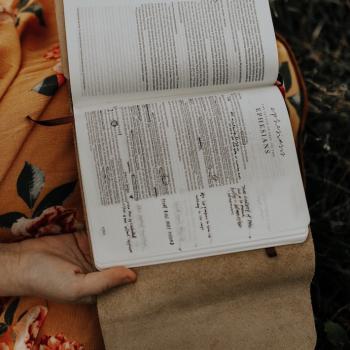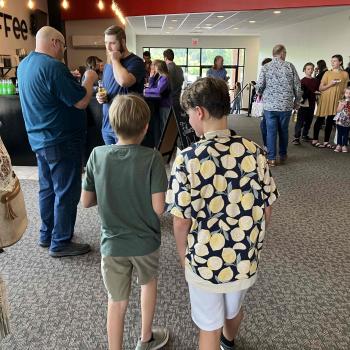I picked up a Spirituality & Health magazine in the waiting room of 14th Street Chiropractic, as I have before.[1] The publication is always a little interesting to me because of the interreligious dialogue. I’m calling it interreligious dialogue, not interfaith, the latter remaining within the bounds of the Christian communion. I may be defining the terms this way because I am more attached to the historical definitions than all of the current variants.
When I looked at the table of contents I wondered if I could hear something from such an unlikely source, you know really hear.[2] We all want to hear something that’s of God. So I offer this narrative as a longread.
My commitment is more to interfaith dialogue, something I love. However, I turned to Paul’s column, partly because I wanted to read something about the administration of money from a new voice (or new to me).[3]
i. The Awareness Test
Paul recently attended the Parliament of World Religions in Toronto. He took thousands of books with him to give away, along with postcards for children’s education and his nonprofit. As he directed the heavy pushcart through the common areas of the convention to his booth . . . over and over again . . . no one stopped to help . . . not once.
Paul decided to make an experiment out of it, one that he had learned while in a previous faith community. They used to call the experiment the Awareness Test. So Paul started contorting his face and straining while pushing the cart through the common areas. He even broke a sweat. He didn’t mind the work, but he was surprised when no one offered to assist . . . at all.
Paul was a speaker on the main panel during the last night of the convention. He concluded by talking about his experience. What follows are three little paragraphs summarizing his thoughts from the Awareness Test, and on suffering in general.
ii. Paul Sutherland on Suffering
I was a bit dismayed with all the so-called religious people who were running around chatting about the Golden Rule and being their brother’s keeper but who were completely indifferent and unattached to seeing a fellow human being who could use a hand.
One of my teachers from long ago gave me a lecture about suffering, and the phrase that stuck with me was “Suffering exists so that we have something to do.” In other words, work to end suffering. Don’t get attached to it, but do something. The disconnection between how humans see ourselves in the world and how we really are in the world is endlessly fascinating to me. We rationalize that we are too busy to help that fellow traveler, or that our help will be rejected, or that we will just be enabling some bad behavior if we help. We tell ourselves that it is not our job to help. We may feel bad about not helping – perhaps because we know that helping feels so good.
“Seal the door where evil dwells” is a line from the Great Invocation that I recited often while living in Uganda whenever I saw corruption.
iii. Why does Paul’s article speak to me?
Well, first of all, I really like his idea of handing out free books with postcards for a cause, and for the nonprofit.
That’s marketing. I learned long ago in youth ministry that larger size cards are sometimes better than business cards. People have to hold on to postcards longer without sticking them in a wallet or small purse.
Secondly, I wonder what people would think of gently used books.
Perhaps I could sell them at conferences instead of to a book store down the road. That way, I would at least have an opportunity to mix it up with people in real time. I’ve inherited a lot of books over the years, but perhaps it would be good to invest in Christian leaders.
One pastor and handyman once told me, “I’ll give you any tool that I have two of.” It’s just a thought. I have multiple copies of some books.
Another minister I know would keep extra books on hand to mentor men. He would simply loan out his extra copies, so people didn’t have to buy a book at first.
On the other hand, I don’t get out a lot to my tribe’s conferences these days. We’re starting our Centennial celebration this week, so I’ll be tuning in to every live stream that I can. Thankfully, at least I’ll be connecting at some of our district conferences. Some of our best friends have only visited once, because NW Michigan is just too far for them to travel. There are plenty of other conferences in this region where I can use marketing ideas like Paul’s.
There are other reasons the article spoke as well. Do we teach a Theology of suffering often enough?

iv. “Don’t get attached to it”
This particular quote is good to remember, whether someone is facing immediate suffering, or in someway helping others who are going through it. The quote speaks to me of letting go of hurts that people don’t cause, or of forgiving when the pain is caused by people. We all have a tendency to allow pain to become a grudge. We then allow grudges to become bitterness, if we’re always ruminating on it. In this way, we could become emotionally attached to suffering.
v. “The disconnection”
Forget about people chatting about the Golden Rule and all that. Who even noticed Paul? He was apparently dressed for the convention, not as an employee of the convention center, from what I read in the rest of the article. Do we turn and look away from those in need, or are we so oblivious to others that we don’t even really notice them?
I think the real question is not who noticed Paul. The real question may not even be, who notices me?
The question to ask is Who do I notice? Maybe we could also ask Who does my clique notice?
We see from Paul’s little experiment that it doesn’t matter whether it’s bullies in the junior high schoolyard, higher education in general, higher leadership in low church, or high church. Our niche often becomes our clique.
For the record, I do not believe Paul wrote with a negative tone about any particular religious group, including Christians. It was just an experiment. I hope my broad generalizations are not misconstrued as a tone either.
Another question could arise from a good social scientist. “Ah, but can we replicate Paul’s experiment?” I would guess that we could, but that is not the question that Paul seems to be asking.
The question I’m posing to you the reader is Who do I notice? Who do we notice (those in my groups, my people and me)?
When we start addressing that question, we may be able to start doing some homework on “The disconnection.”
vi. “Seal the door where evil dwells”
Paul says that sometimes we keep from doing good, because we know it feels good. I’ve been a witness to the fact that sometimes people have a morbid attachment to suffering.
In the Winnie the Pooh tales, there’s a certain pride that Eeyore takes in saying, “Thanks for noticing me” . . . as if he’s not a crucial character in the Hundred Acre Wood. However, he’s definitely attached the attention he receives from self-abasement . . .
We have to remove this barrier for some people. Then they can justify the fun of doing good for others. They can find joy in participating on teams that are doing outreach.
After all, how can any of us measure Eeyore’s worth to the crew on all their missions in the Hundred Acre Woods? We simply can’t. He’s priceless.
There are other barriers that people are attached to. These have to be removed if they want to “Seal the door where evil dwells.”
vii. We could try to guess Paul’s religion
This is something I have not attempted to do. I am simply writing a reflective response to Paul’s article.
I’ve always believed that the voice of the Father comes to us on many waters, as if He speaks through many voices in certain seasons of our life. Also, I always remember that the voice of the Spirit is like a gentle whisper from Someone who is not vying loudly for my attention.
You may ask What if Paul isn’t a Christian? Let me remind you of the voice of Balaam, a Canaanite prophet-for-hire (Numbers 22-24). The Moabites paid Balaam to curse Israel, but he blessed them. Or perhaps I could point out that if God spoke to Balaam through his donkey (not Eeyore I assume) then God can certainly speak through any person.
Paul offers allusions to Scripture throughout the article. Likewise, the Patristics hardly ever used Scripture references either, but their works are full of quotes. You sort of have to read Scripture to pick out their quotes. Paul’s article stands.
viii. I’m thankful for Paul’s reminder
We all face suffering and pain, but do we allow ourselves to become attached to it? What are we doing with it? Paul reminds me that suffering may have a telos.
“Suffering exists so that we have something to do.”
Emmanuel, thank You for becoming one of us, to be with us.
May we notice those around us and may the Holy Spirit direct us to those we can do something for, as He did for You. This is one way that the barriers we’re attached to, barriers that keep us from doing good and from being with others as You are with us, can be removed.
We will certainly glorify You with every opportunity we have to participate in Your good work. Amen
notes:
[1] 14th Street Chiropractic, “Traverse City’s Chiropractic Headquarters:” Three Chiropractors and two massage therapists with over 30 years of experience, located in Traverse City. Focusing on the treatment & healing of back pain, sciatica, and neck pain. Massage available. [2] This has become a different type of article for me on a couple counts, both perhaps prompted by what I may be hearing.First of all, I can recognize when the Spirit is carrying me along in His current. This article may not be more academic, homiletical, or even administrative like my other recent posts. However, this article may be for someone, or for me. I cannot ignore it.
I took homiletics at Messenger College with Vernell Ingle
He rigorously trained us in outlining and delivering sermons, but he also taught us to pay attention to the Spirit’s lead. The Spirit directs the Gifts. Prophecy and Teaching are a couple of them. Modern day preaching stems from these Gifts, but if the Spirit directs these Gifts, then He can also redirect them. Do we get too attached to our homiletical paradigms and outlines?
May I be willing to allow Him to redirect my Patheos content calendar as well.
Secondly, I have been thinking about implementing a different type of writing outline from time to time.
I’ve discussed outlines with a major house
The outline idea is to offer a brief history, followed by a larger section on Christian living, and then a prayer. In this case, I use the extended quote from Paul to segue into a section on Christian living. This is my first attempt at this form of writing, at least my first intentional attempt.
For more about me or our new nonprofit, see:
[3] Paul Sutherland, “The Heart of Money: What’s Next on Your Awareness Test?,” Spirituality & Health: The Soul|Body Connection, May/June 2019: 86-87.Paul is no longer in Uganda, but Michigan. He bought Spirituality & Health years ago, moved its HQ to Traverse City, and recently sold it. However, he is still writing a column and in some ways remains a stakeholder.












